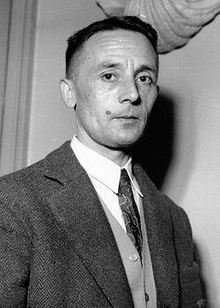Julien Gracq
| Julien Gracq | |
|---|---|

Gracq in 1951
|
|
| Born |
27 July 1910 Saint-Florent-le-Vieil, Maine-et-Loire, France |
| Died | 22 December 2007 (aged 97) Angers, France |
| Occupation | Novelist, critic, playwright, poet |
| Nationality | French |
| Period | 1938–2002 |
|
|
|
| Signature |  |
Julien Gracq (French: [gʁak]; 27 July 1910 – 22 December 2007), born Louis Poirier in Saint-Florent-le-Vieil, in the French département of Maine-et-Loire, was a French writer. He wrote novels, critiques, a play, and poetry. His literary works were noted for their dreamlike abstraction, elegant style and refined vocabulary. He was close to the surrealist movement, in particular its leader André Breton.
Gracq first studied in Paris at the Lycée Henri IV, where he earned his baccalauréat. He then entered the École Normale Supérieure in 1930, later studying at the École libre des sciences politiques (Sciences Po.)
In 1932, he read André Breton's Nadja, which deeply influenced him. His first novel, The Castle of Argol is dedicated to that surrealist writer, to whom he devoted a whole book in 1948.
During the Second World War, he was a prisoner of war in Silesia with other officers of the French Army. One of the friendships he formed there was with author and literary critic Armand Hoog.
In 1950, he published a fierce attack on contemporary literary culture and literary prizes in the review Empédocle titled La Littérature à l'estomac. When he won the Prix Goncourt for The Opposing Shore (Le Rivage des Syrtes) the following year, he remained consistent with his criticism and refused the prize.
Gracq taught history and geography in secondary school (high school) until he retired in 1970.
In 1979, he wrote the foreword to a re-edition of the Journal de l'analogiste (1954) by Suzanne Lilar, a work he called a "sumptuous initiation to poetry" ("une initiation somptueuse à la poésie").
...
Wikipedia
